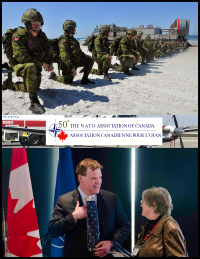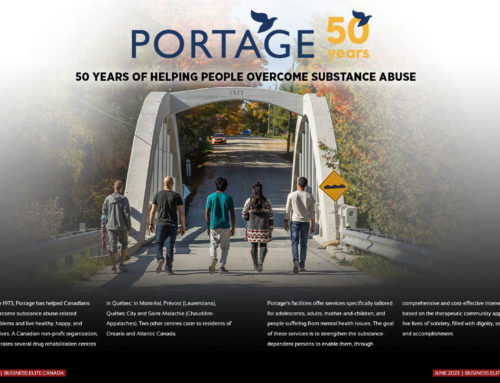Communicating the Value of Security to Canadians
By Rajitha Sivakumaran
Many Canadians know NATO to be a military and political alliance consisting of 28 members in the North Atlantic region. Founded in 1949, this organization served to limit Soviet expansion, prevent the return of nationalist militarism to Europe and bring about political harmony. Recent newsworthy discussions have centred on the membership solicitation extended to former Yugoslav republic, Montenegro. The invitation has produced a mix of contradicting responses — approval, disinterest, riots and a plea to organize a national referendum.
Although diverging opinions are present even here in Canada, which has been a NATO member since the organization’s inception, rigorous education and public awareness efforts have smoothed the ripples. When the North Atlantic Treaty was first signed, each of the founding 12 members set up detached organizations for the purposes of promotion and education. In Canada, the NATO Association of Canada (NAOC) informs Canadians about NATO and the nation’s role in NATO. All of the individual country associations, including NAOC, are members of the umbrella establishment, the Atlantic Treaty Association (ATA).
“Our role is to inform Canadians broadly about security issues and specifically about NATO and Canada’s role in NATO,” said Julie Lindhout, NAOC’s president. A long-time high school teacher and having held various senior-level positions at the Ontario Ministry of Education, Lindhout joined NAOC in 1992 as vice-president of education. Ten years later, she assumed her present role and in this capacity, she recently visited Montenegro. Despite being a small country, Montenegro has actively contributed to NATO initiatives, such as its participation in the Partnership for Peace program, and Lindhout sees the many advantages of a NATO membership, including a boost for the Montenegrin tourism industry.
“I think it makes the country feel connected and part of the modern world. Certainly anybody I spoke to while I was in Montenegro said those kinds of things,” Lindhout said. What she noticed during her visit was that a significant number of the population showed a lack of interest and this interest was reflective of geography — coastal and urban inhabitants were generally in favour while the interior, which is composed of many isolated villages, showed disinterest.
“I think a lot of countries see a NATO membership as a step up to EU membership, which of course is also an advantage to Montenegro,” Lindhout said. Being situated in the Eurozone, the country has already started reaping the benefits.
NATO’s definition of security goes well beyond military defence. Although it is primarily a defence organization, Article 2 of NATO’s constitution emphasizes economic security — each member and partner country will aid one another in the development of democratic institutions, promote good economic well-being and refrain from interference in regards to each country’s policy in those areas.
Empowerment through knowledge
Most Canadians don’t need to think about security on a day-to-day basis. “But when you do bring it to mind, either through an article that we publish or one of our events, suddenly they realize how lucky they are. That’s one of the things that we always do at our events, to show Canadians the value of what they have,” Robert Baines said. Baines has been a part of Team NAOC for six years, serving a double-barreled role as the association’s development officer and executive director for the Canada-Albania Business Council.
NAOC brings forth opportunities for Canadians to see beyond newspaper headlines. Every year, NAOC organizes two conferences in Toronto and Ottawa featuring prominent speakers, including representatives from the Department of Global Affairs and the Department of National Defence, who lead discussions on current issues in security and foreign policy. Past conferences have centred on themes such as conflict zones like Ukraine and Afghanistan. Last year’s theme was on the increasing role of women in security as outlined by Resolution 1325 of the UN Security Council. The gala dinner hosted by the association in June featured former prime minister Brian Mulroney, who was an active supporter of NATO during his tenure.
Canada has hosted the ATA general assembly three times in the past and will be hosting the upcoming meeting in October. Outside of these conferences, NAOC organizes roundtable discussions, where guest speakers have included the commanding officers of frigates who have returned from overseas operations or military personnel who have been involved in past operations in Afghanistan, Ukraine and the Baltics. These speakers help to broaden people’s idea of what security is all about, Lindhout said.
“We constantly need to be reminded of that which we don’t see but which holds up our civilization. It’s like constant maintenance on a building,” Baines said.
The association is also actively involved in publication, written mostly by interns and young researchers. “One of the goals that we have is to enable young people who are interested in making a career out of international affairs or security policy to actually work in that field, do research and get published,” Lindhout said.
In fact, young people play an active role in the association, from organizing events to running high school outreach programs and participating in essay competitions. Former interns have found work in various places that demand a global outlook, like the government, NATO, academia, think tanks, the military and corporations.
Canada on the international stage
“The new government has attempted as much as possible to show a strong face on the international scene, but I don’t think that Canada has ever really been lacking in a strong sense of security or trying to promote peace and security around the world. It’s always been something that Canada is very good at,” Baines said. Canada has continually stepped up when needed as seen in the Afghanistan conflicts and Libya mission.
NAOC is constantly pushing the Canadian public to be conscious of security. As a trading nation, it is of utmost importance; Canada produces far more than it could ever consume internally and yet that level of productivity is necessary to continually support the kind of prosperity presently enjoyed by Canadians.
“We don’t have prosperity unless we have the reliability of free trade, of open sea lanes, of reliable delivery dates and making sure that people have a certain amount of trust in the financial stability of our international system. It is a very intertwined thing, security,” Baines said.
Secure shipping lanes are particularly important; about 90 per cent of the goods that come into the country come by water. This was one of the reasons why NATO supported anti-piracy activities off the Horn of Africa and Canada participated by sending frigates and surveillance planes.
“Canadians’ personal prosperity and well-being depend on having stable and secure trading environments across the world,” Lindhout said.
Canada has secured the spotlight on the international stage in other ways too. It was one of the first countries to have women in combat roles and women are now gradually rising to higher levels within the command structure of the Armed Forces. “It puts a focus on the fact that when women are heavily involved in the peace process you get a different dynamic at work and you get a different dynamic within the population,” Lindhout said, pointing to the impact of mothers on children in conflict countries; they influence or change children’s attitudes about conflict more greatly than men. They can also bring in other points of view in peace discussions, Lindhout added.
www.natoassociation.ca







